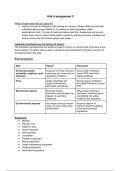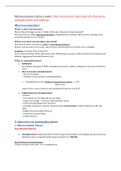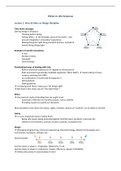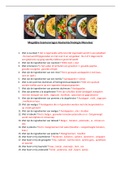FMT3701
Assignment 02
Unique number : 385978
Foundation Phase
Mathematics Teaching
1
, QUESTION 1
1.1 Evaluate three relevant child development theories and explain the applicability
of each one to the teaching and learning of mathematics in the Foundation Phase.
(20)
Cognitive Constructivist Theory - Jean Piaget
Piaget believed that learning is a continuous process of building and gathering
knowledge and that children acquire knowledge by interacting with people, ideas and
objects. According to Piaget there are two processes of adaption that children use to
construct knowledge. These two processes are: Assimilation and Accommodation.
When a child adds new information to their existing knowledge, we call is
Assimilation. When children make changes to their existing knowledge, we call it
Accommodation. In 1936 Piaget proposed stages through which our intellectual
maturity grows. He claimed that the stages can’t change as it is fixed. But that there
is no specific time limit for a stage.
There are four stages namely :
Sensorimotor stage : This stage takes part between birth and 2 years of age. During
this stage we learn through exploration by using our senses while moving around. At
this stage their knowledge of the world is still limited as it is based on physical
interactions.
Preoperational stage : This stage takes place between 2 and 7 years of age. In this
stage, children develop concepts and start reasoning. During this stage , they
haven’t developed logical thinking and reasoning and aren’t able to master
conversations. Children first need to develop these skills before they can move on to
the next stage. During this stage symbols play an important role as they use it to
represent other objects.
Concrete operational stage : This stage takes place between 7 and 11 years of age.
In this stage children develop the ability to think logically and systematically to help
organise the information they use to solve problems. However, they still need to
experience concrete objects and hands-on activities. They are not yet able to think
abstractly or to solve problems in their head. Children are able to classify objects by
looking at size, colour and mass.
Formal operational stage : This stage takes place between 11 and 15 years of age.
Children during this stage no longers need concrete objects. They develop the ability
to think in abstract ways. They also develop the ability to think logically , solve
problems and plan.
The Social Constructivist Theory – Vygotsky
In this theory we focus on how important language is in learning. According to
Vygotsky children used shared experiences and learning to make sense of their
2
Assignment 02
Unique number : 385978
Foundation Phase
Mathematics Teaching
1
, QUESTION 1
1.1 Evaluate three relevant child development theories and explain the applicability
of each one to the teaching and learning of mathematics in the Foundation Phase.
(20)
Cognitive Constructivist Theory - Jean Piaget
Piaget believed that learning is a continuous process of building and gathering
knowledge and that children acquire knowledge by interacting with people, ideas and
objects. According to Piaget there are two processes of adaption that children use to
construct knowledge. These two processes are: Assimilation and Accommodation.
When a child adds new information to their existing knowledge, we call is
Assimilation. When children make changes to their existing knowledge, we call it
Accommodation. In 1936 Piaget proposed stages through which our intellectual
maturity grows. He claimed that the stages can’t change as it is fixed. But that there
is no specific time limit for a stage.
There are four stages namely :
Sensorimotor stage : This stage takes part between birth and 2 years of age. During
this stage we learn through exploration by using our senses while moving around. At
this stage their knowledge of the world is still limited as it is based on physical
interactions.
Preoperational stage : This stage takes place between 2 and 7 years of age. In this
stage, children develop concepts and start reasoning. During this stage , they
haven’t developed logical thinking and reasoning and aren’t able to master
conversations. Children first need to develop these skills before they can move on to
the next stage. During this stage symbols play an important role as they use it to
represent other objects.
Concrete operational stage : This stage takes place between 7 and 11 years of age.
In this stage children develop the ability to think logically and systematically to help
organise the information they use to solve problems. However, they still need to
experience concrete objects and hands-on activities. They are not yet able to think
abstractly or to solve problems in their head. Children are able to classify objects by
looking at size, colour and mass.
Formal operational stage : This stage takes place between 11 and 15 years of age.
Children during this stage no longers need concrete objects. They develop the ability
to think in abstract ways. They also develop the ability to think logically , solve
problems and plan.
The Social Constructivist Theory – Vygotsky
In this theory we focus on how important language is in learning. According to
Vygotsky children used shared experiences and learning to make sense of their
2










